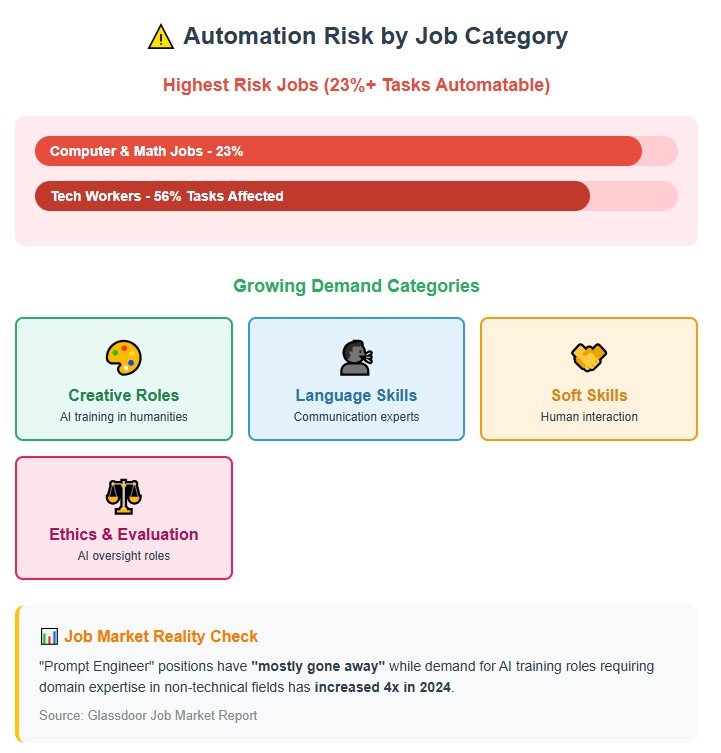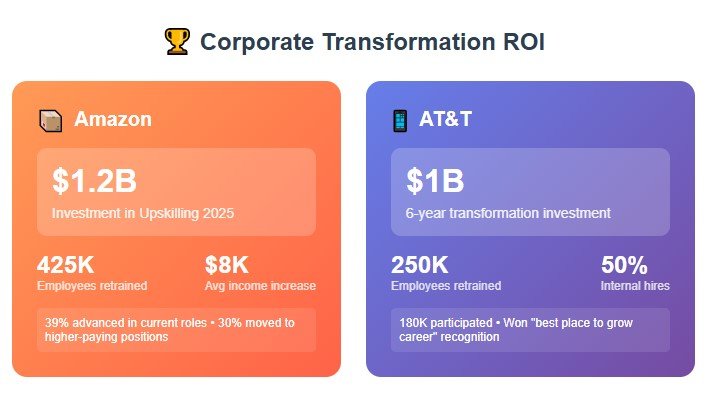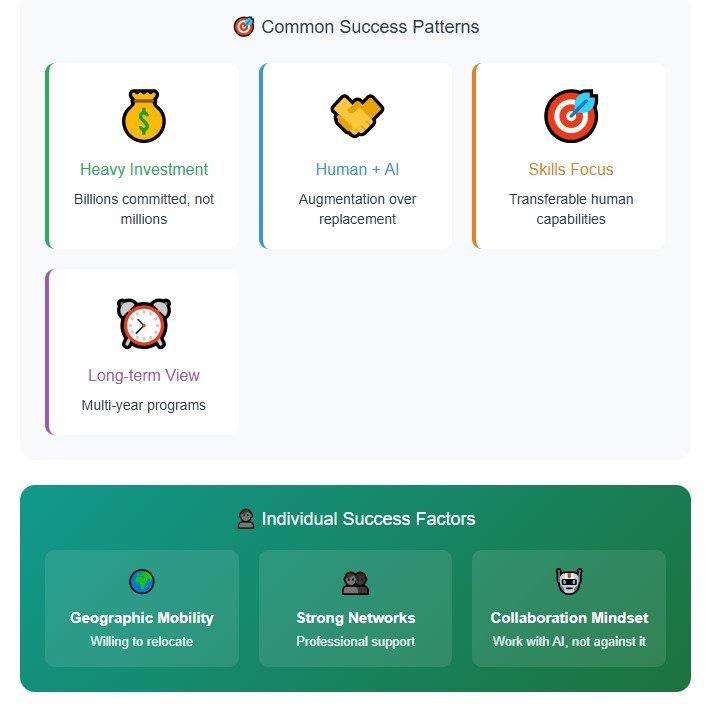
You’re scrolling through LinkedIn at 11 PM, anxiety creeping in as another article warns that AI will replace your job by next Thursday. Sound familiar?
Here’s the thing everyone’s getting wrong about the AI job apocalypse—it’s not happening the way you think.
After diving deep into the latest research from major HR organizations and analyzing real data from companies already living in our AI future, I’ve got some news that might surprise you. The robots aren’t coming for your job. They’re coming to make you better at it.
But only if you know which skills to focus on.
The Plot Twist No One Saw Coming
🔄 The AI Job Reality Check
Net New Jobs
by 2030
AI Skill Premium
average wage increase
AI-Exposed Roles
job availability growth
💰 Salary Impact by Role Type
Ready for a statistic that’ll flip your perspective?
AI is projected to create 170 million new jobs by 2030 while only displacing 92 million. That’s a net gain of 78 million positions, according to the World Economic Forum’s latest report.
Wait, there’s more.
Job availability has grown 38% in roles most exposed to AI over the past five years. Not shrunk. Grown.
And here’s the kicker—workers with AI skills are now commanding a 56% wage premium. That’s not a typo. We’re talking about an extra $18,000 annually for non-tech roles that require AI competency.
The People Winning Aren’t Who You’d Expect

Here’s where it gets really interesting.
You know who’s benefiting most from AI tools? It’s not the tech bros or coding wizards. It’s the people who traditionally get left behind.
MIT and Stanford researchers discovered something fascinating when they studied customer service teams. Overall, agents using AI tools saw 14% productivity gains. But here’s the twist—low-skilled workers saw 34% improvements while the high-skilled agents barely budged.
The same pattern showed up everywhere they looked. Novice programmers got more help from AI coding tools than experienced developers. Poor writers narrowed their performance gap with skilled writers when using ChatGPT.
AI is like a cognitive elevator—it lifts the people who need it most.
Why “Learn to Code” Might Be Terrible Advice Right Now

Remember when everyone said you had to learn coding to survive the AI revolution?
Yeah, about that…
Computer and math jobs show the highest automation scores—23% of their tasks are already automatable. Tech workers face having 56% of their tasks automated or augmented, and most of those will be fully automated, not just assisted.
Even “prompt engineer” positions, which were all the rage six months ago, have “mostly gone away,” according to Glassdoor. Meanwhile, demand is surging for AI training roles that require expertise in humanities, languages, and—wait for it—soft skills.
The jobs AI is creating often require the exact opposite of technical skills.
What HR Leaders Are Looking For (The Real List)
🎯 The Future-Proof Skills Hierarchy
Emotional Intelligence
71% of workers worry about AI in HR – human connection is premium
Critical Thinking
The “AI BS Detector” – fastest growing cognitive skill demand
Adaptability & Change Management
Companies invest billions – Amazon $1.2B, AT&T $1B
Data Literacy & AI Integration
Not coding – interpreting and managing AI outputs
Creativity & Innovation
Original thought – machines follow patterns, humans break them
💼 Corporate Investment Reality
I surveyed research from McKinsey, Deloitte, PwC, and analyzed hiring data from LinkedIn and Indeed. Here’s what HR professionals are prioritizing:
1. Emotional Intelligence (Yes, Really)
Why it matters: 71% of workers are worried about AI making HR decisions. They want to work with humans who get them.
Harvard’s research shows that when managers develop emotional intelligence, workers are significantly more likely to “go the extra mile.” TalentSmartEQ works with 75% of Fortune 500 companies for a reason—emotional intelligence directly correlates with team performance.
Real talk: In a world of chatbots, being genuinely human is your superpower.
2. Critical Thinking (The BS Detector Skill)

Here’s the thing about AI—it’s confidently wrong. A lot.
McKinsey found that “higher cognitive skills” are experiencing the fastest growth in demand. But it’s not about out-thinking AI. It’s about knowing when AI is feeding you garbage.
Swiss university studies show students who developed critical thinking alongside AI literacy were way better at evaluating AI outputs and avoiding what researchers call “cognitive offloading”—basically, turning your brain off because the computer said so.
Bottom line: Someone needs to be the adult in the room when AI gets creative with facts.
3. Adaptability (The Skill That Pays Bills)
89% of HR professionals consider this essential. And the companies proving it works are putting serious money behind it.
Amazon dropped $1.2 billion on its Upskilling 2025 initiative. The results? They retrained 425,000 US employees, who saw average income increases of $8,000 annually. 39% advanced in their current roles, and 30% moved to higher-paying positions.
AT&T went even bigger—$1 billion over six years to retrain 250,000 employees as their hardware jobs disappeared. They filled 50% of 45,000 new roles internally and won recognition as the “best place to grow your career.”
The message: Companies will invest in people who can roll with change.
4. Data Literacy (Not Coding, Understanding)
This isn’t about becoming a programmer. It’s about making sense of what AI spits out.
IBM committed to reskilling 30 million people globally by 2030 because they found 40% of the workforce needs this skill. Yet only 6% of companies have started meaningful AI upskilling programs.
Translation: Massive opportunity for early movers.
General Assembly’s data science bootcamp graduates report 99.2% job placement within a year, with many tripling their salaries within three years.
5. Creativity (The Uniquely Human Thing)
AI can remix existing ideas brilliantly. But original thought? That’s still our territory.
Creative thinking ranks #3 on the World Economic Forum’s future skills list. UX design bootcamp graduates report salary increases of nearly triple their pre-training income, even as AI design tools proliferate.
Why it works: Machines follow patterns. Humans break them.
The Wake-Up Call from History

Before we get too optimistic, let’s check the history books.
During the British Industrial Revolution, mechanization eliminated jobs for 8% of the population—and those effects lasted over 50 years. Oxford researchers found that economists consistently underestimated job displacement, especially for women and marginalized workers.
Nobel laureate Daron Acemoglu offers a reality check: He predicts AI will only automate 5% of tasks and add just 1% to GDP over the next decade. His concern? We’re using AI too much for replacement and not enough for augmentation.
The lesson: This transition will take decades, not years. Plan accordingly.
What’s Working (Real Success Stories)

The companies and people thriving right now share common strategies:
Amazon’s approach: Massive investment in human skills development alongside AI literacy. Results speak for themselves.

AT&T’s transformation: They didn’t just retrain people—they created entirely new career pathways.
Individual winners: They learned to collaborate with technology rather than compete against it. They stayed mobile, maintained strong networks, and focused on augmenting their unique human capabilities.
Your Action Plan (What to Do This Week)
🚀 Skills Development Roadmap
1 Immediate Actions (3-6 months)
📜 Google AI Essentials
$49/month certificate
💝 EQ Training
Coursera free resources
🤝 Professional Networks
Join field communities
2 Medium-term Development (6-18 months)
📊 Data Analytics
Google/IBM certificates
👔 Leadership Programs
Management training
📁 AI Portfolio
Showcase AI-augmented work
3 Long-term Positioning (18+ months)
🎓 Advanced Certifications
Domain expertise + AI
🎤 Thought Leadership
Speaking & mentoring
🚀 AI Integration Projects
Lead implementation
💰 Certification ROI Comparison
General Assembly
AWS Certifications
Google Certificates
UX Design Training
🎯 Key Success Principle
Stop trying to be irreplaceable. Start becoming indispensable.
The future belongs to workers who excel at uniquely human capabilities while leveraging AI as a powerful tool for amplifying their impact.
Based on salary data and certification success rates, here’s your roadmap:
Immediate (Next 3-6 Months)
- Get Google AI Essentials Certificate ($49/month, worth it)
- Start emotional intelligence training (free resources on Coursera)
- Join professional communities in your field
- ROI check: AWS certification holders see 25% salary increases, averaging $27,000
Medium-term (6-18 Months)
- Data analytics certification (75% of Google program graduates report career improvement within six months)
- Leadership development programs
- Build a portfolio showing AI-augmented work
Long-term (18+ Months)
- Advanced certifications in your domain + AI integration
- Mentor others and speak at industry events
- Lead AI integration projects that showcase human judgment
Key insight: Stop trying to be irreplaceable. Start becoming indispensable.
The Bottom Line (What This Means for You)
Here’s the counterintuitive truth the data reveals: the AI revolution rewards human skills more than technical ones.
The companies investing seriously in workforce development are seeing dramatic returns. Individuals combining emotional intelligence, critical thinking, and adaptability with AI literacy are commanding significant wage premiums.
We’re still in the early stages, with decades of adaptation ahead. But unlike previous technological revolutions, we have both real-time data and historical knowledge to make better decisions.
The workers and organizations that thrive will embrace AI as a complement to human capabilities, not a replacement.
Your Next Move
The message from HR leaders is crystal clear: develop your humanity, learn to work with AI, and prepare for a job market that values uniquely human qualities more than ever.
The robots aren’t coming for your job—they’re coming to make you phenomenally better at it.
Ready to get started? Pick one skill from the action plan above and commit to it this week. Your future self (and bank account) will thank you.
What’s the first skill you’re going to develop? The AI revolution is waiting for your unique human contribution.




